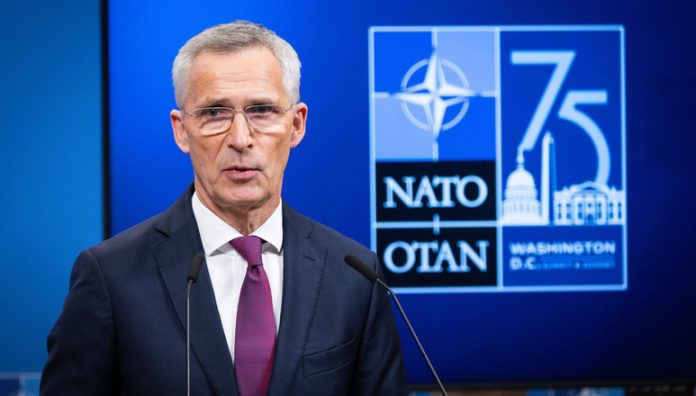In spite of promises to provide Ukraine with comprehensive assistance in its conflict with Russia, NATO leaders fail to make clear the possibility of Ukraine’s future membership in the military alliance, according to Euractiv.
“Ukraine is moving closer to NATO. More funding, more military support, more security agreements and more interoperability constitute a bridge to NATO membership and a very strong package for Ukraine at the summit,” NATO Secretary-General Jens Stoltenberg told reporters on Friday.
The stance of NATO on Ukraine remains that one day Ukraine might join the military alliance, but for now the country is still in a state of war. In addition, the Ukrainian government has to fulfil two conditions set out in the treaty – democratic reforms and a contribution to security. NATO members stay divided between those who want Ukraine not to face additional conditions already stipulated in the NATO treaty, such as the ability to contribute to the security and democracy of the alliance, and those who want to remind Kyiv that it still has a long way to go on reforms.
Indeed, many of the reforms are also part of the European Union accession process and they likewise include the continuation of democratic and the Ukrainian security reforms and defence sector. Since last year’s Vilnius summit, Kyiv has made significant progress on reforms, including in defence procurement, according to a US State Department official, but unplanned reshuffles of senior officials and indicators of corruption problems remain high.
The divergence in public attitudes remains and is a serious observation. A group of foreign policy experts on Wednesday urged NATO members to refrain from pushing the issue of Ukraine’s membership at the summit, according to the letter from more than 60 analysts, as a future conflict with Russia could no longer involve Ukraine alone but other alliance members as well. The group’s letter reads:
The closer NATO comes to promising that Ukraine will join the alliance once the war ends, the greater the incentive for Russia to keep fighting the war. The challenges Russia poses can be managed without bringing Ukraine into NATO.
Eternal NATO waiting room
The issue of Ukraine’s membership in NATO has surfaced before, last year at the Vilnius summit, where leaders confirmed the country’s future in the alliance and reaffirmed the current state of relations with Ukraine by setting up a high-level body for emergency consultations. But still the question of “accuracy” remains elusive, as no one is giving a timeline regarding when membership will come through.
For nearly a year now, NATO has been trying to strike a balance between recognising Ukraine’s progress in reforms and modernisation of its armed forces for membership and appeasing Kyiv’s hopes for early accession. But on the eve of the summit in Washington this year, the wording is still up for debate to balance views on when Ukraine might become a member. However, one of the people at the negotiating table at the time noted that the war really might be the only viable exit from the eternal NATO waiting room.”
Thus, the membership of Ukraine in NATO is unlikely to reach a final decision when the leaders arrive in Washington on Tuesday. Much of the indecision stems from Germany and the US, as they, despite Eastern European NATO members, have so far refrained from supporting Ukraine’s immediate membership and cannot reach a consensus on whether and how to strengthen NATO’s language on Ukraine’s future membership in the alliance this time around.
Instead, a US State Department spokesman stated just days before the summit that “We are pulling together a series of deliverables that will serve as essence as a bridge to membership.” “The Bridge to membership” includes institutionalising Western support and training for Ukraine, an annual political financial commitment of 40 billion euros, a commitment to the country’s membership status and the appointment of a NATO special envoy to Kyiv.
Despite, several NATO diplomats voiced doubts as to whether this particular wording chosen to mark Ukraine’s progress would bring any benefit to both the process and credibility, since it makes NATO’s promise to Ukraine of one day becoming a member of the organisation difficult to fulfil. They stated:
It’s nice that we’re getting into the business of building bridges, the question is how strong or stable are they? (…) It makes a difference whether the bridge is made of paper, wood or steel and certainly it makes a difference whether its short or rather long-distance. (…) The thing about the bridge is that we don’t know how long it is.
As the Ukrainian government seeks membership in the alliance, the country’s citizens say they want the West to provide them with more additional weapons, according to a survey by the European Council on Foreign Relations (ECFR). Only 22 per cent of Ukrainian respondents said they were in favour of accepting NATO membership.
